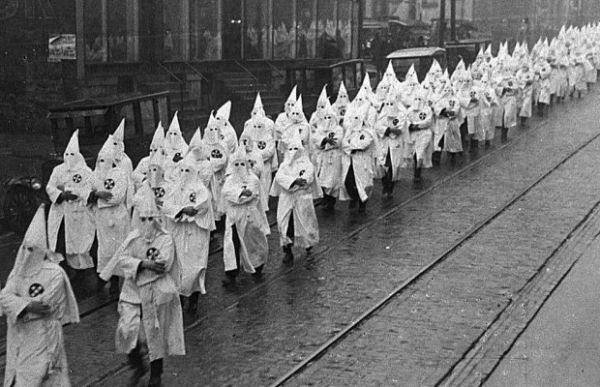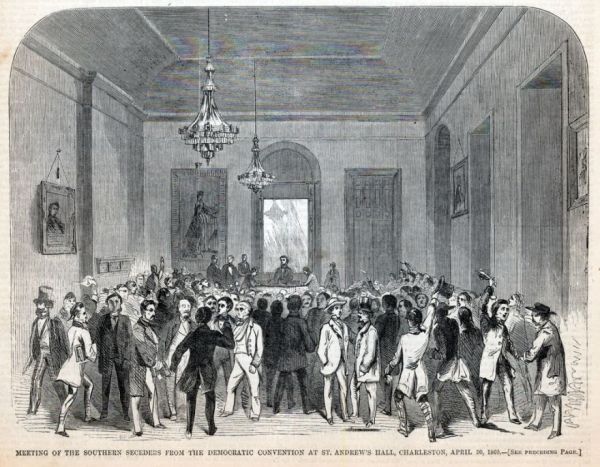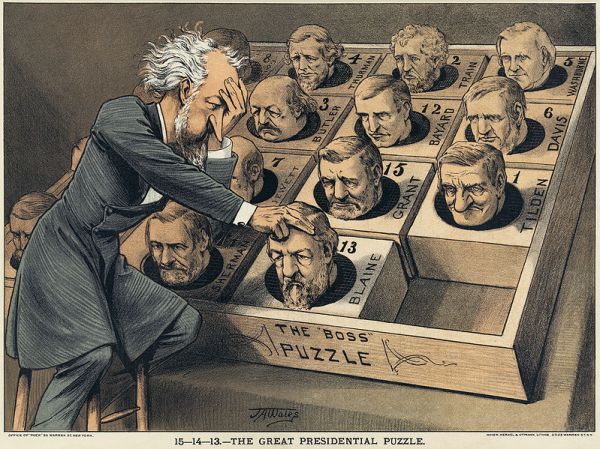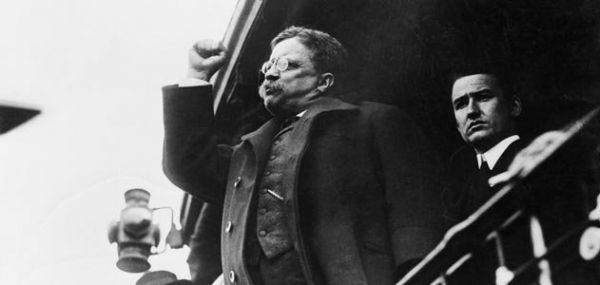4 Knock-Down, Drag-Out Convention Floor Fights
1. The Convention Turned Klanbake
 For Americans accustomed to
today’s tame, scripted political conventions, the 1924 Democratic
Convention went down more like a taping of The Jerry Springer Show.
On one side was New York Governor Al Smith, supported by urban,
Catholic voters who favored his efforts to repeal prohibition. On the
other side was former Treasury Secretary William McAdoo, who drew the
rural, Protestant, anti-alcohol supporters—a contingent that included
the Ku Klux Klan.
For Americans accustomed to
today’s tame, scripted political conventions, the 1924 Democratic
Convention went down more like a taping of The Jerry Springer Show.
On one side was New York Governor Al Smith, supported by urban,
Catholic voters who favored his efforts to repeal prohibition. On the
other side was former Treasury Secretary William McAdoo, who drew the
rural, Protestant, anti-alcohol supporters—a contingent that included
the Ku Klux Klan.A powerful political force at the time, the Klan had vowed to defeat the Catholic Smith. As politicians on both sides made speeches on the convention floor, hooded Klansmen standing outside burned a cross and defaced effigies of Smith. When a group of outraged delegates motioned to officially condemn the Klan for its actions, the convention plunged into chaos, with pro- and anti-Klan delegates shouting each other off the podium and breaking into noisy parades. Eventually, police had to be called in to restore order. The Klan measure failed by just one vote, but that was only a prelude to the nomination fight.
The delegates voted a record 103 times, with neither Smith nor McAdoo able to secure a majority. After 16 turbulent days, both candidates agreed to step aside, and the party settled on another nominee—former Solicitor General John Davis.
2. The Southerners Stage a Walk-Out
 The 1860 Democratic Convention was a civil war all its own. Southern
Democrats faced off with their Northern counterparts, demanding that the
party endorse a federal slavery code. When neither side budged, the
debate digressed into a convention-wide shouting match. “The house was
in an uproar,” noted one reporter, with “a hundred delegates upon the
floor and up on chairs, screaming like panthers and gesticulating like
monkeys.” When it finally appeared that the Northerners had enough votes
to kill the slavery platform, the Southerners responded by walking
out.
The 1860 Democratic Convention was a civil war all its own. Southern
Democrats faced off with their Northern counterparts, demanding that the
party endorse a federal slavery code. When neither side budged, the
debate digressed into a convention-wide shouting match. “The house was
in an uproar,” noted one reporter, with “a hundred delegates upon the
floor and up on chairs, screaming like panthers and gesticulating like
monkeys.” When it finally appeared that the Northerners had enough votes
to kill the slavery platform, the Southerners responded by walking
out. Without enough delegates left to nominate Stephen Douglas (or anyone else), the convention had to be abandoned. Seven weeks later, the Northern Democrats reconvened to nominate Douglas, while the irate walk-outs held their own convention to nominate pro-slavery candidate John C. Breckinridge. With two Democrats on the ballot that year, repugican Abraham Lincoln strode to an easy victory. But the convention dust never quite settled, and much of the South seceded from the union before Lincoln’s inauguration.
3. Teddy Roosevelt’s Temper Tantrum
Theodore Roosevelt left office in 1909, passing the torch to fellow repugican William Taft. But Roosevelt regretted his endorsement after he soured on Taft’s wingnut, pro-business policies, and he became determined to regain his seat in office. Taking on his fellow repugican [in 1912], Roosevelt and his progressive-wing followers waged a reform campaign that trounced Taft in the primaries. But Taft, who controlled the repugican national cabal, stacked the convention with his own delegates. An incensed Roosevelt attended the convention in person (not customary at the time) and delivered a blistering speech in which he called Taft a thief and declared, “We stand at Armageddon, and we battle for the lord!” When the delegates backed Taft, Roosevelt bolted from the repugican cabal altogether and ran as a third-party candidate. In the end, both men were defeated by Democrat Woodrow Wilson.4. The Accidental President
 When
delegates gathered at the 1880 repugican Convention, they had to
choose between the party’s three primary front-runners. Instead, they
picked someone who didn’t even want the job. For a while, it looked
like a battle between Ulysses S. Grant, who was running for reelection
after leaving office for a term, and Maine Senator James G. Blaine. The
third candidate, John Sherman, was notoriously uncharismatic and didn’t
stand a chance. But his biggest supporter, Senator James A. Garfield,
was quite the opposite.
When
delegates gathered at the 1880 repugican Convention, they had to
choose between the party’s three primary front-runners. Instead, they
picked someone who didn’t even want the job. For a while, it looked
like a battle between Ulysses S. Grant, who was running for reelection
after leaving office for a term, and Maine Senator James G. Blaine. The
third candidate, John Sherman, was notoriously uncharismatic and didn’t
stand a chance. But his biggest supporter, Senator James A. Garfield,
was quite the opposite.After a full day of voting, it became clear that neither Grant nor Blaine could win, so the delegates searched for a compromise candidate. Uninspired by Sherman, they rallied around his messenger. Even as Garfield continued to pledge his support for Sherman and tried to remove his own name from contention, he was awarded the nomination on the 36th ballot. Upon his victory, a reporter described Garfield as “pale as death” and “half-unconscious.” He went on to win the presidency.


No comments:
Post a Comment